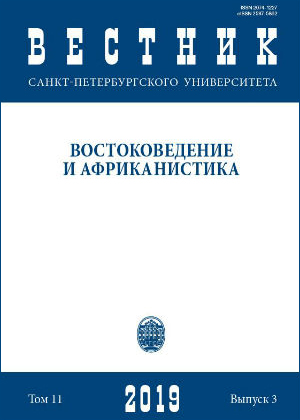Patterns of Hausa-English code-switching in Jamila Danfajo’s novel Kukan so
DOI:
https://doi.org/10.21638/spbu13.2019.305Abstract
This paper addresses the novel Kukan so (Cry of love) by Jamila Muhammad Danfajo (2007). This survey presents textual analysis of two parts of the book in respect to the nature, characteristic features, and functions of Hausa-English code-switching within the literary text. A growing body of literature provides sociolinguistic study of code-switching within the speeches and conversation of Hausa-English bilinguals (Nasiru Ajatau, Yusuf Nuhu Inuwa, and the others). The roots of this phenomenon within the literary texts are still to be explored. Despite a large amount of works on African literatures, only a few of scholars draw attention to how African authors use code-switching in their writing (Bandia, Larsson, and the others). Unlike those authors who write in Western languages, Jamila Danfajo uses African language, Hausa. The writer switches to English quite regularly, both in the author’s speech and that of the characters. The survey shows that Hausa-English CS displayed in Jamila Danfajo’s novel allows the matrix language exert varying degrees of control over insertion. The described models of CS are obviously determined by the degree of congruence between Hausa and English with regard to particular grammatical categories. In many cases, the contradiction between formally non-congruent categories (as lexical gender) is not resolved by the use of embedded language islands. In contrast, interpretation-based patterns are established. CS patterns are often provided by pre-existing models of loanwords adaptation. However, in some cases the foundation for how the congruence is achieved is not obvious.
Keywords:
Hausa popular literature, Northern Nigeria, women’s literature, literary codeswitching.
Downloads
References
Downloads
Published
How to Cite
Issue
Section
License
Articles of "Vestnik of Saint Petersburg University. Asian and African Studies" are open access distributed under the terms of the License Agreement with Saint Petersburg State University, which permits to the authors unrestricted distribution and self-archiving free of charge.





